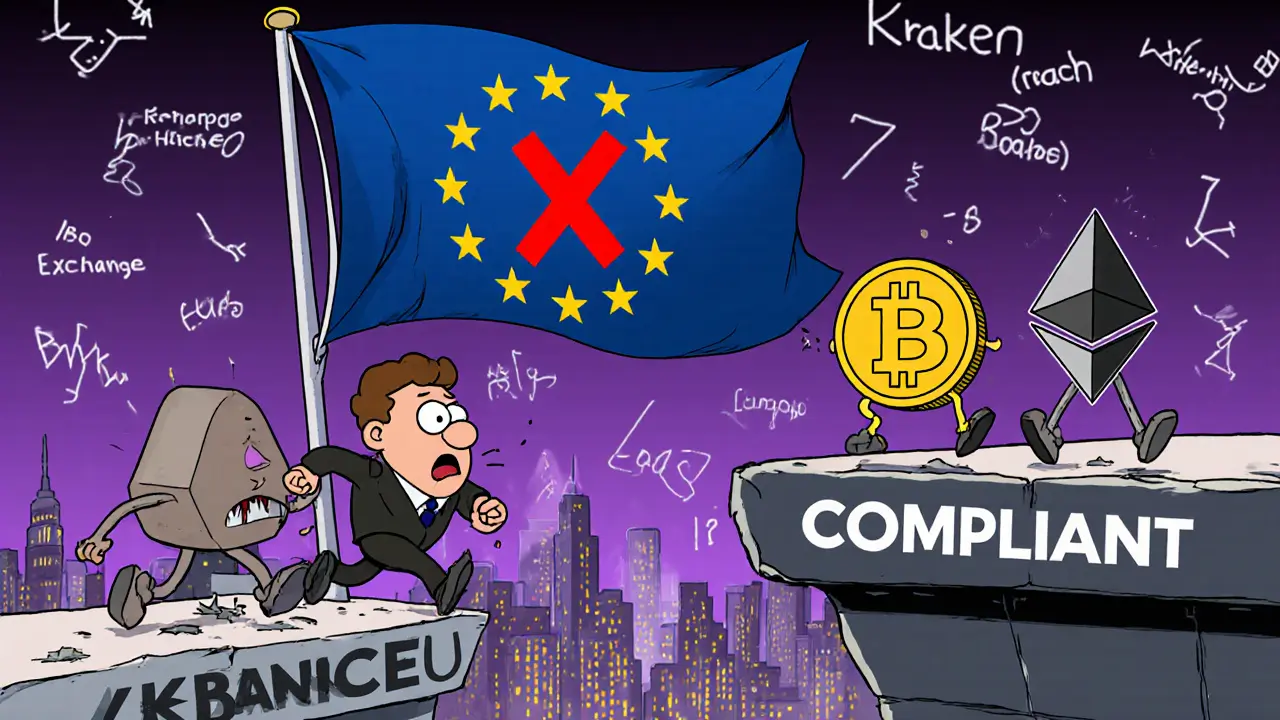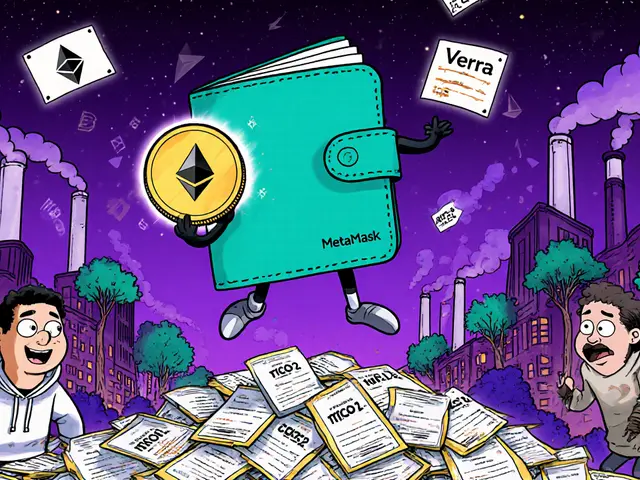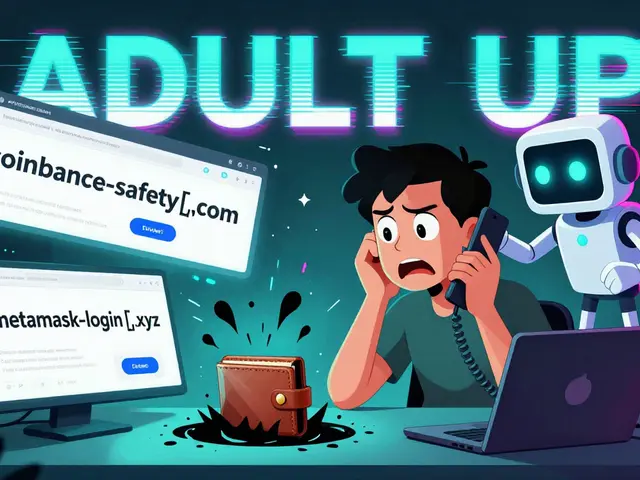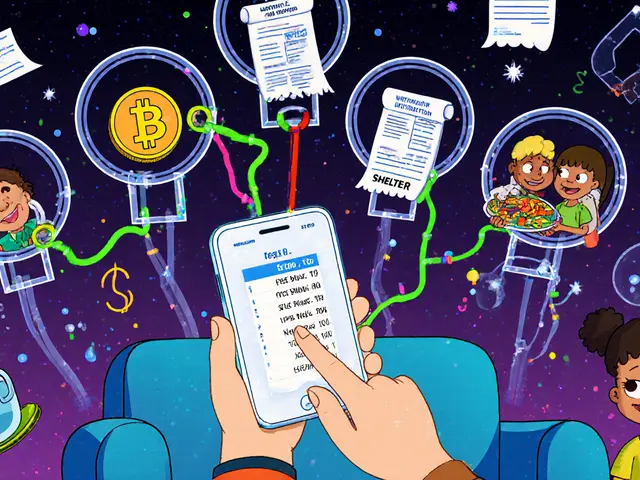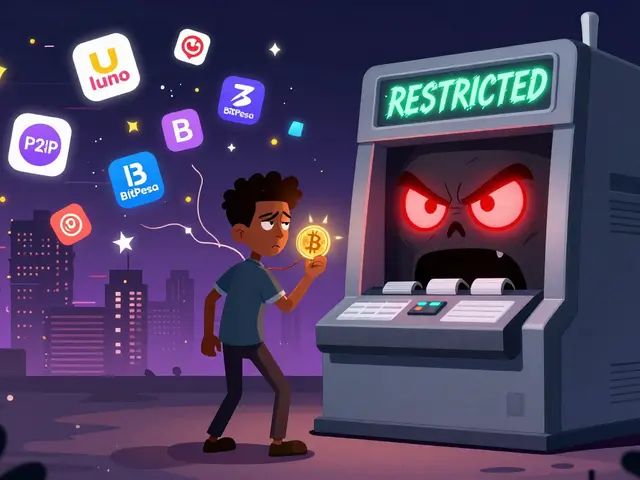EU Privacy Coin Ban Countdown
Time Remaining Until EU Privacy Coin Ban
The European Union will prohibit regulated exchanges from supporting Monero and Zcash starting July 1, 2027.
What does this mean for you?
If you hold Monero or Zcash on EU-regulated exchanges, you must move your assets before July 1, 2027. The EU ban doesn't affect personal non-EU wallets but will remove trading options on regulated platforms.
Privacy coins like Monero and Zcash are set to disappear from EU exchanges by July 2027
If you own Monero or Zcash, and you live in the European Union, you need to pay attention. Starting July 1, 2027, it will be illegal for any regulated crypto platform in the EU to support these coins. Not because they’re stolen, hacked, or scammy - but because they’re too private. The EU’s new anti-money laundering law, Regulation 2024/1624, doesn’t just tweak rules. It draws a hard line: no more anonymous transactions. Monero and Zcash were built to make transactions untraceable. That’s their whole point. And now, that point is against the law in Europe.
Why the EU is targeting privacy coins
The EU isn’t going after Monero and Zcash because they’re popular. They’re going after them because they can’t be tracked. The new law, called AMLR, says crypto-asset service providers - exchanges, wallets, trading platforms - must know who’s sending and receiving every euro’s worth of crypto. If a transaction is over €1,000, identity verification is mandatory. That’s fine for Bitcoin. Every Bitcoin transaction is on a public ledger. You can follow the money. But Monero? It hides the sender, receiver, and amount using ring signatures and stealth addresses. Zcash lets users choose shielded transactions that hide everything. To regulators, that’s not privacy. It’s a loophole for crime.
European authorities don’t claim these coins are used for crime. They say they enable it. And in their eyes, that’s enough. The European Crypto Initiative confirmed the regulation is final. Even though some technical details are still being worked out, the ban on privacy coins isn’t negotiable. It’s baked in.
What happens to your Monero or Zcash after 2027
Here’s the key thing: the law doesn’t make it illegal to own Monero or Zcash. It makes it illegal for EU-based platforms to trade them, store them, or exchange them. So if you have coins in a non-EU wallet - say, a self-custody wallet on a decentralized exchange outside the EU - you can still hold them. You just won’t be able to cash out through Kraken, Binance EU, or any other platform regulated by the EU.
That means two things. First, if you want to sell your Zcash, you’ll need to find a non-EU exchange. That’s possible, but it’s harder. You’ll face higher fees, longer wait times, and more risk. Second, if you’re holding these coins in an EU-based exchange right now, you’ll have to move them out before July 2027. Otherwise, the platform will freeze or delist them. No warning. No grace period. Just a hard cutoff.
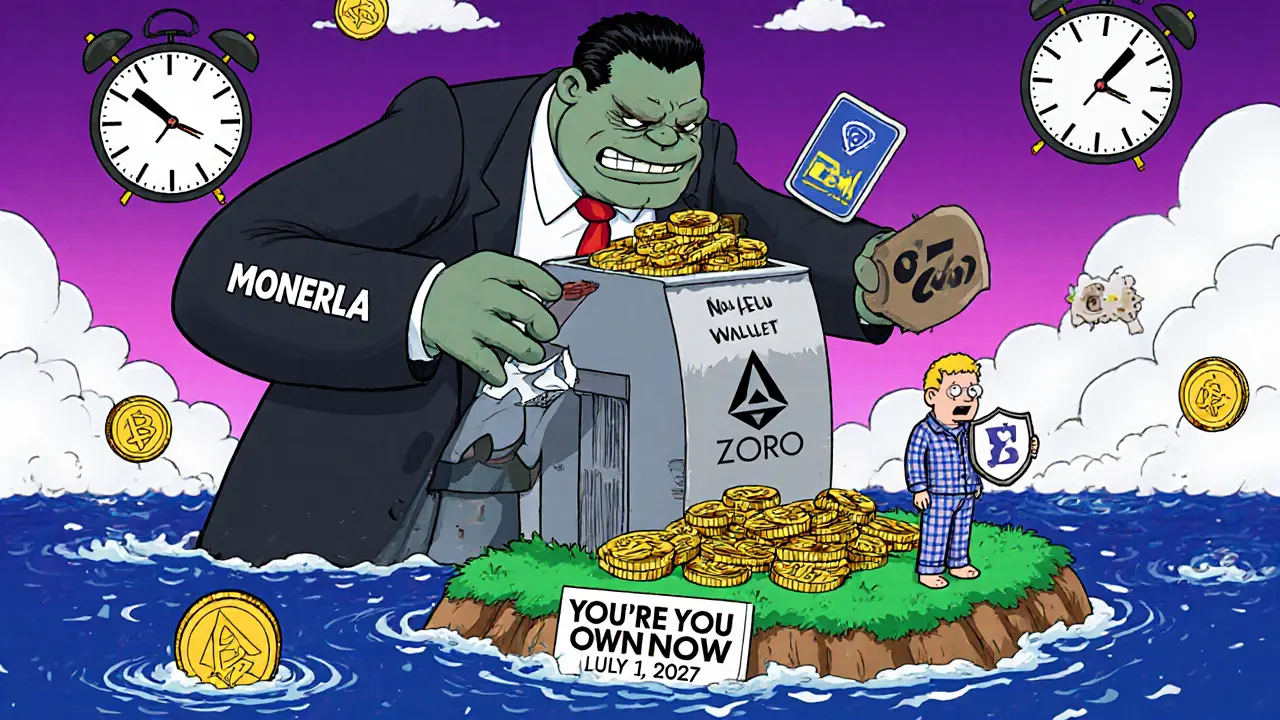
How the ban will be enforced
The EU isn’t relying on luck or voluntary compliance. A new body called AMLA - the Anti-Money Laundering Authority - will start monitoring the biggest crypto firms in 2026. These are the platforms handling over €50 million in transactions or serving tens of thousands of users. AMLA will check their systems to make sure they’ve cut off privacy coins. If they haven’t, the fines start at 5% of annual turnover. Repeat offenses? Up to 10%. That’s enough to make any company shut down privacy coin services fast.
Smaller platforms aren’t off the hook. The European Banking Authority is working on detailed rules that will apply to all regulated entities. Even a small crypto exchange in Lisbon or Warsaw will need to build filters that block Monero deposits and withdrawals. They’ll need to update their KYC systems to flag any attempt to convert other coins into privacy coins. This isn’t optional. It’s a legal requirement.
What this means for the crypto market in Europe
The EU is home to over 450 million people. It’s one of the biggest crypto markets in the world. When the EU speaks, the rest of the world listens. The ban will shrink the liquidity for Monero and Zcash in Europe by an estimated 30-40%. That’s not just about trading volume. It’s about trust. If you can’t easily convert your privacy coins into euros, their value drops. Some analysts predict a 20-30% price dip for both coins by early 2027 as traders rush to exit before the deadline.
But here’s the twist: this might push more users toward decentralized platforms. If centralized exchanges can’t touch privacy coins, people will turn to peer-to-peer markets, non-custodial wallets, and cross-border DEXs. That’s not what regulators want. But it’s what happens when you ban something popular. The market finds a way.
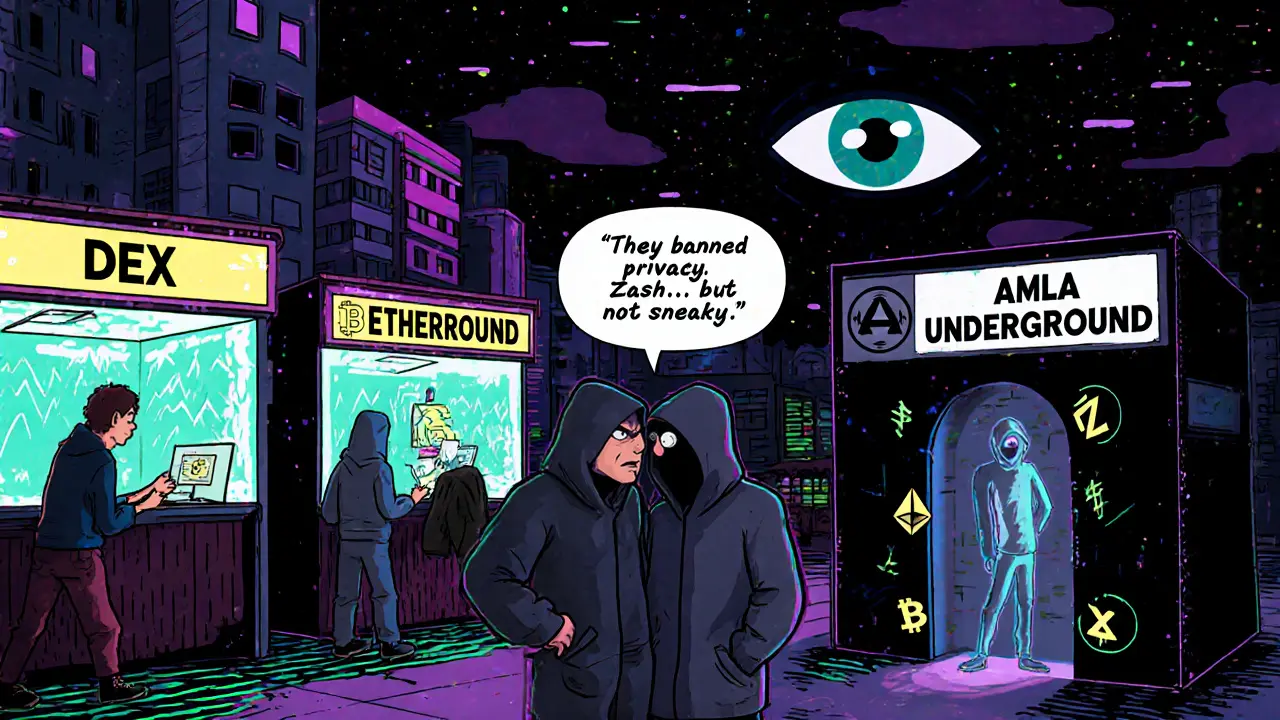
Global ripple effects
The EU’s move isn’t happening in a vacuum. The U.S. has been quietly pressuring crypto platforms to limit privacy coin support. The UK is reviewing similar rules. Australia and Canada are watching closely. The EU’s 2027 ban could become the global standard. If a platform wants to operate in Europe - and most do - they’ll have to comply. And once they build the filters for Europe, they’ll likely apply them everywhere.
That’s why privacy coin developers are already preparing for life after the EU. Some are exploring new privacy tech that might pass regulatory muster - like selective disclosure or zero-knowledge proofs that reveal only what’s needed. But those are still experiments. Right now, Monero and Zcash are the only real options. And they’re being outlawed.
What you can do now
You have two years. That’s not a lot, but it’s enough to plan.
- Move your coins out of EU exchanges. If you’re holding Monero or Zcash on Binance EU, Kraken, or any other regulated platform, transfer them to a non-custodial wallet. Use Exodus, Ledger, or a hardware wallet you control.
- Know your exit options. Research non-EU exchanges that still support privacy coins. Platforms like KuCoin (based in Seychelles) or Bitrue (based in Singapore) may still allow trading. But be careful - these aren’t regulated. You’re on your own if something goes wrong.
- Don’t panic sell. The price may dip as the deadline nears, but that doesn’t mean your coins are worthless. If you believe in privacy as a right, hold. Just make sure you can access them when you need to.
- Stay informed. The EUCI and European Banking Authority will release more details through 2026. Watch for updates on how wallet providers will be classified. Some might be forced to block privacy coin transactions even if they’re not exchanges.
Is this the end of privacy in crypto?
Some people say this is the death of financial privacy. Others say it’s just the beginning of a new kind of crypto - one that works within the system. The truth is, the EU isn’t banning all crypto. Bitcoin, Ethereum, Solana - they’re fine. As long as you can trace the money, you’re welcome. But if you want to hide it? That’s no longer allowed in Europe.
This isn’t just about money laundering. It’s about power. Who controls the flow of value? The EU says it’s the state. Privacy coin advocates say it’s the individual. Neither side is wrong. But in 2027, the EU’s rules will win. And the crypto world will have to adapt.
Privacy isn’t dead. But in Europe, it’s now illegal to offer it through regulated channels. The rest of the world will decide if that’s a model worth copying.
Can I still hold Monero or Zcash after the 2027 EU ban?
Yes. The EU ban only stops regulated exchanges and financial institutions from handling privacy coins. You can still hold Monero or Zcash in a personal wallet - as long as it’s not managed by an EU-based service. You just won’t be able to buy, sell, or convert them through platforms like Kraken or Binance EU after July 1, 2027.
Will the EU ban affect Bitcoin and Ethereum?
No. Bitcoin and Ethereum are not privacy coins. Their transactions are fully traceable on public blockchains. The EU’s new rules target only coins designed to hide transaction details, like Monero and Zcash. Transparent cryptocurrencies are fully compliant and will continue to operate normally in the EU.
What happens if I use an EU exchange after July 2027 to trade Monero?
You won’t be able to. By law, EU-regulated exchanges must disable Monero, Zcash, and other privacy coins before the deadline. If you try to deposit or withdraw them after July 1, 2027, the platform will reject the transaction. Attempting to bypass this could result in your account being frozen or reported to regulators.
Are there any legal alternatives to Monero and Zcash in the EU?
No direct alternatives exist under EU law. Any coin with built-in privacy features - like Dash or Pirate Chain - will also be banned. The only compliant options are transparent cryptocurrencies like Bitcoin, Ethereum, or Litecoin. Some projects are experimenting with privacy tech that meets AMLR requirements, but none are live yet.
Can I move my privacy coins to a non-EU exchange before the ban?
Yes, and it’s strongly recommended. Transfer your coins to a non-EU wallet or exchange before July 1, 2027. This ensures you retain access to your assets. Just be aware that non-EU platforms may have higher fees, slower support, and no legal protection if something goes wrong.
Why is the EU banning privacy coins but not cash?
Cash is still legal, but it’s heavily restricted in the EU. You can’t use cash for transactions over €10,000. The EU is applying the same logic to crypto: if it’s anonymous and high-value, it’s risky. Privacy coins are digital cash without limits. Regulators see them as a loophole. That’s why they’re banning them - not because they’re evil, but because they’re uncontrolled.
Will this ban lead to more use of decentralized exchanges (DEXs)?
Absolutely. Once centralized exchanges stop supporting privacy coins, users will turn to DEXs like Uniswap or Thorchain - especially those hosted outside the EU. This could increase demand for non-custodial wallets and privacy-focused DEXs. But remember: DEXs aren’t regulated. You’re responsible for your own security.
Is there any chance the EU will reverse this ban?
Unlikely. The law was passed in May 2024 and is already in the implementation phase. Public consultations are only for technical details, not the core ban. Even privacy advocates admit the outcome is final. The EU is committed to this path. The only way to avoid it is to operate outside the EU’s jurisdiction.
How will this affect the price of Monero and Zcash?
Prices have already reacted to the news, with volatility increasing since 2024. As the 2027 deadline approaches, expect more selling pressure from EU-based holders looking to exit. However, if global demand remains strong outside the EU, prices could stabilize or even rebound. The long-term value depends on adoption in non-EU markets.
What should I do if I’m a crypto business operating in the EU?
Immediately audit your platform’s supported assets. Remove Monero, Zcash, and any other privacy coin from your trading pairs. Update your KYC and AML systems to flag attempts to convert into privacy coins. Consult the EUCI’s AML Handbook for compliance steps. Failure to comply risks heavy fines or loss of operating license.
